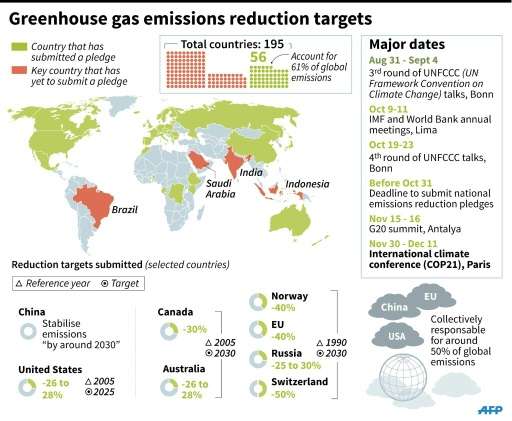US government scientists declared July the hottest month in history, and said 2015 appears set to overtake 2014 as the hottest year since records began in 1880
Diplomats gather in Bonn from Monday to thrash out the draft of a climate-rescue pact to be adopted at a year-end UN conference in Paris.
With just 10 official negotiating days before 195 nations must seal the deal in the French capital, time is running out to bridge deep and long-standing divisions on who should do what to halt the march of global warming.
Just in recent days, there were fresh reminders of what is at stake if the world misses the UN goal to limit global warming to two degrees Celsius (3.6 degrees Fahrenheit) over pre-Industrial Revolution levels. We have already reached 0.8 C.
Last week, US government scientists declared July the hottest month in history, and said 2015 appears set to overtake 2014 as the hottest year since records began in 1880.
India and Pakistan have been hit by killer heatwaves this year, and California is in the grips of a historic drought.
NASA warned this week that one metre (three feet) of average sea level rise is unavoidable over the next 100-200 years due to ice sheet melt and ocean warming.
UN Secretary General Ban Ki-moon urged countries on Wednesday to "accelerate the rhythm of negotiations" ahead of the November 30-December 11 climate conference, saying: "We don't have much time."
Analysts said the five-day Bonn round will show whether rank-and-file diplomats are taking recent cues from political bosses.
In July, France announced that ministers had made a "breakthrough" at a huddle in Paris.
Crucially, they concurred there should be a review every five years after 2020, when the agreement kicks in, of the collective effort to curb planet-warming greenhouse gases to ensure the 2 C target remains within sight.
All eyes will be on Bonn to see if the ministerial rapprochement on this issue filters through.
"Just trying to get a bit of the spirit of the ministerials back into Bonn would be great," Liz Gallagher, climate diplomacy leader at the E3G think tank, told AFP.
Data on national greenhouse gas emissions reduction targets and timetable of major climate negotiations this year
Alden Meyer, an analyst with the Washington-based Union for Concerned Scientists, said there must be close coordination between negotiators and their political bosses.
"Negotiators need to do the job of clarifying where things stand, framing options very sharply," he said.
"But then it's really the ministers and the leaders that have to find some of the landing zones, some of the compromises."
'No planet B'
Ministers will next meet in Paris on September 6-7, and again in October in Lima at an IMF-World Bank pow-wow with climate finance on the agenda.
On September 27, Ban Ki-moon and heads of state will talk climate on the sidelines of a UN summit in New York.
While these talks are not part of official negotiations, they should guide the pact-crafting efforts.
"The political decisions and compromises are going to be made above the paygrade of the negotiators," said Meyer.
A farmer ploughs his dusty field as a severe drought continues to affect California
As things stand, the draft agreement under review in Bonn runs over 80 pages—largely a laundry list of countries' often conflicting options, in places as many as 11 per issue, for ensuring a liveable planet.
The disagreements are fundamental.
How to divvy out responsibility for carbon cuts between rich nations, which have polluted for much longer, and developing countries which need to power fast-growing populations and economies?
How will developed nations meet their promise of $100 billion (89 billion euros) of climate finance per year from 2020?
To date, more than 50 countries responsible for nearly 70 percent of global emissions have submitted carbon-curbing plans.
But scientists say the numbers do not add up and the world is on track for warming way above 2 C—a recipe for ever more extreme droughts and floods, disease spread and island-drowning sea-level rise.
To aid negotiators, the co-chairmen of the talks have re-packaged the draft text into three sections—the first containing the binding, overarching goal, set in stone; the second with elements that can be altered over time; and the third, by far the biggest, those that remain in dispute.
There will be a final pre-Paris negotiating round, also five days, in Bonn in October.
"It's a race against the clock," Fabius said at a meeting with Ban.
"Last year was the hottest on record. It seems that this year will be even hotter. There is no plan B, there is no planet B."
© 2015 AFP


























